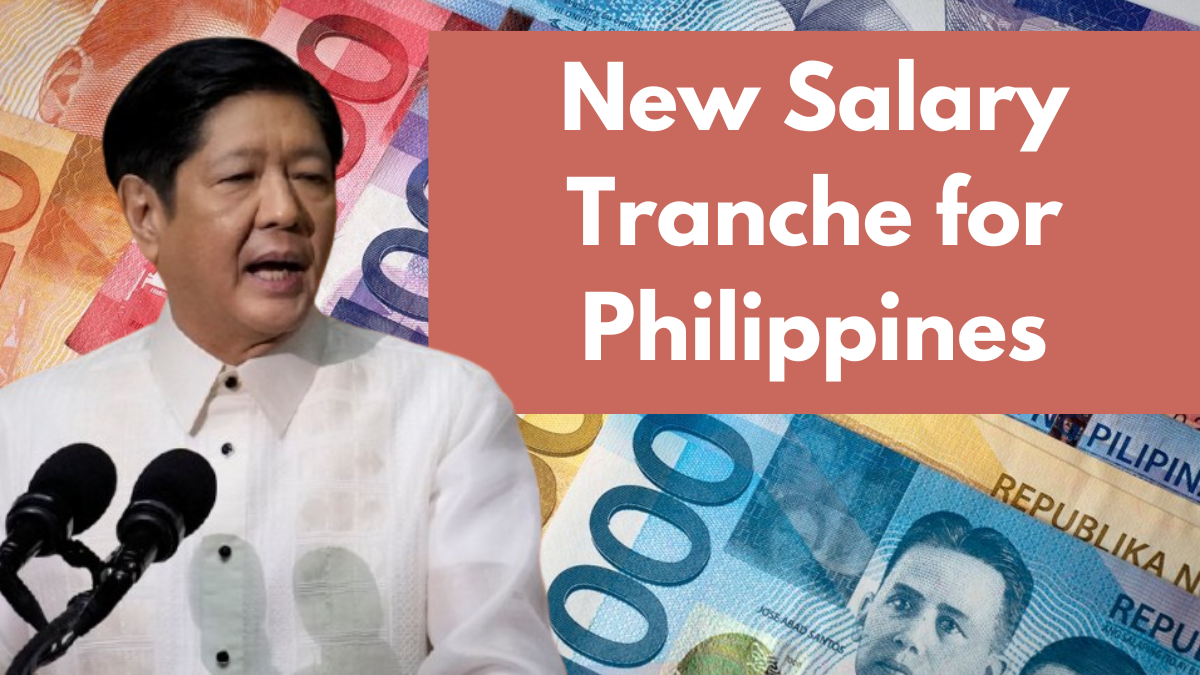The Philippine government has launched the Philippines Salary Tranche, a structured salary adjustment initiative aimed at gradually increasing the wages of public sector employees. This initiative is part of the Salary Standardization Law of 2019, which ensures a systematic and equitable salary increase for government workers. The objective of this program is to provide financial stability for government employees while maintaining economic sustainability.
The program is set to roll out in multiple phases over four years, commencing on January 1, 2025. The increments will be determined based on job classification, experience, and contributions to public service. In this article, we explore the details, schedule, impact, and latest developments related to the Philippines Salary Tranche 2025.

Overview of the Philippines Salary Tranche
| Feature | Details |
|---|---|
| Program Name | Philippines Salary Tranche |
| Implemented By | Government of the Philippines |
| Legal Basis | Salary Standardization Law of 2019 |
| Start Date | January 1, 2025 |
| Implementation Period | Four Years (2025-2027) |
| Estimated Salary Increase | 23.24% for government employees |
| Official Website | www.dbm.gov.ph |
Key Features of the Salary Tranche
- The salary adjustments will be implemented in a four-phase plan from 2025 to 2027.
- The increments will be determined based on salary grades and job classifications.
- Private sector salaries may be influenced due to competitiveness in the job market.
- The highest minimum wage in 2025 is projected to be ₱505.23 per day in Metro Manila.
- The government will conduct continuous evaluations of salary structures to refine compensation policies.
Salary Tranche Implementation Schedule
The Salary Standardization Law of 2019 mandates a gradual salary increase for government employees. Below is the official timeline:
| Phase | Implementation Date |
| Phase 1 | January 1, 2025 |
| Phase 2 | January 1, 2026 |
| Phase 3 | January 1, 2027 |
| Phase 4 | Subject to economic conditions and government review |
This phased approach ensures that salary adjustments are distributed equitably across various government sectors, including education, healthcare, security, and administration. The gradual increments enable employees to plan their finances effectively while allowing the government to maintain fiscal discipline.
Impact on Different Sectors
Public Sector Employees
- Salary increases will be allocated according to salary grades and levels of responsibility.
- Employees in higher positions and specialized fields will receive greater salary increments.
- Enhanced compensation is expected to motivate government workers and reduce attrition rates.
Private Sector Considerations
- A 6.2% average salary increase is anticipated in the private sector, as per market studies.
- Sectors such as finance, information technology, and healthcare are expected to experience higher salary growth.
- The narrowing wage gap between public and private sectors may intensify competition for skilled professionals.
Regional Salary Differences
- Metro Manila is expected to continue having the highest minimum wage at ₱505.23 per day.
- Adjustments will be made based on inflation rates, economic conditions, and cost of living in different regions.
- Provinces with higher living costs may receive higher salary adjustments compared to less expensive regions.
Latest Developments on the Salary Tranche
Proposed Legislative Amendments
A new salary hike bill has been proposed in the Philippine Senate, aiming to further improve government compensation structures. The proposed amendments seek to:
- Establish regular salary reviews and updates.
- Reduce corruption risks by ensuring fair and transparent wage structures.
- Retain top government talent by offering competitive salaries and benefits.
Government Compensation Study
The Department of Budget and Management (DBM) is conducting an extensive study to:
- Assess the current salary structure and benefits provided to government employees.
- Compare public and private sector salaries to ensure competitiveness.
- Identify areas where further improvements can be made in compensation policies.
The findings from this study will help shape future salary policies to maintain a fair, sustainable, and competitive wage system for public servants.
Conclusion
The Philippines Salary Tranche 2025 represents a major step forward in ensuring fair and structured compensation for government employees. By implementing salary adjustments in a phased manner, the government aims to enhance financial security for public sector workers while maintaining economic stability. The continued evaluation of salary structures and the proposed legislative amendments signal the government’s commitment to improving public service compensation. For more information and official updates, visit www.dbm.gov.ph.
Frequently Asked Questions (FAQs)
1. Who is eligible for the salary increase under the Philippines Salary Tranche 2025?
All government employees, including those in education, healthcare, law enforcement, and administration, will receive salary adjustments based on their respective salary grades and job classifications.
2. Will private sector employees benefit from this salary increase?
While the Philippines Salary Tranche directly applies to government employees, private sector salaries may also increase due to market competitiveness, particularly in industries like finance, IT, and healthcare.
3. How much will the salary increase be for government workers?
The estimated total salary increase is 23.24%, implemented over four years in incremental phases.
4. When will the first salary increase take effect?
The first phase of the salary adjustments will begin on January 1, 2025.
5. Will regional cost-of-living differences be considered in salary adjustments?
Yes, salary increments will account for inflation rates, economic conditions, and regional living expenses, ensuring fair compensation across different locations.
6. How will this program impact the country’s economy?
The structured rollout of salary increases ensures fiscal responsibility, prevents excessive inflation, and helps sustain economic stability while improving the quality of life for government workers.
For More Information Click Here
Akesh is a furniture expert with years of experience in design and craftsmanship. Specializing in sustainable materials, he shares his expertise to help people create stylish and functional living spaces.
